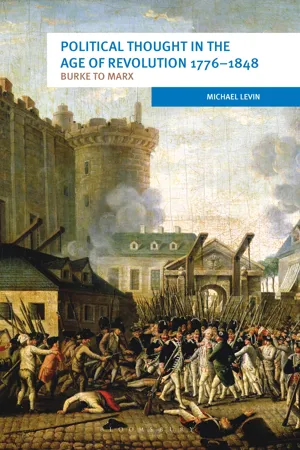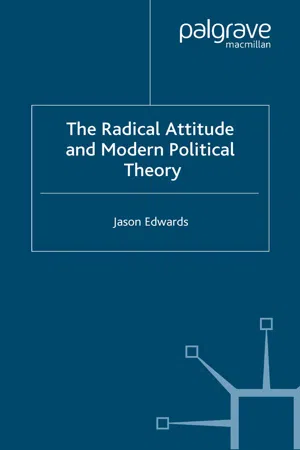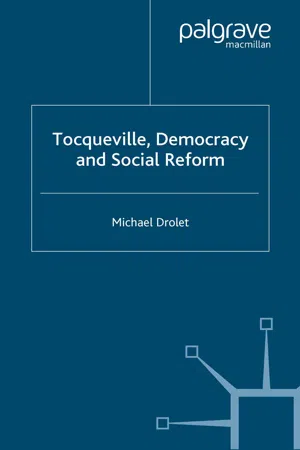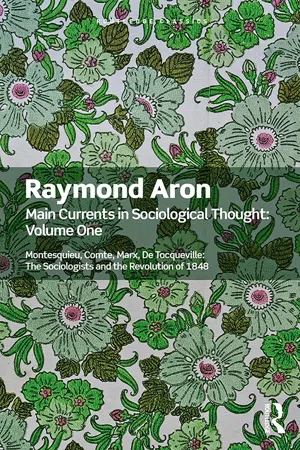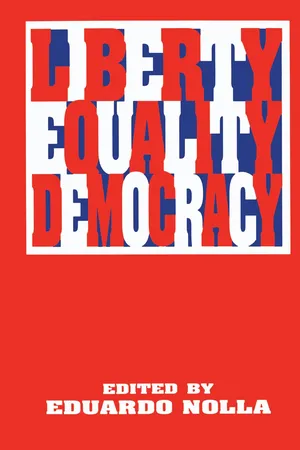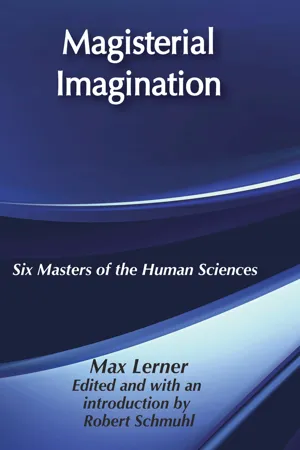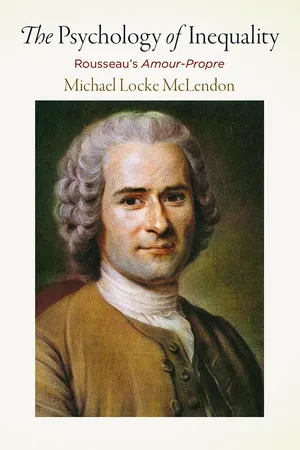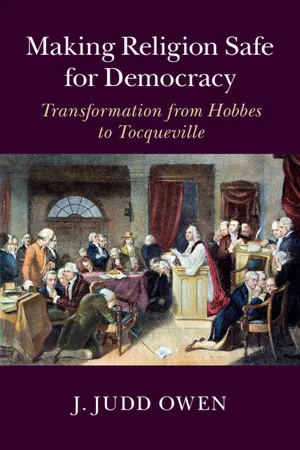Politics & International Relations
Alexis de Tocqueville
Alexis de Tocqueville was a French political thinker and historian known for his work "Democracy in America," which analyzed the American political system and society. He highlighted the strengths and weaknesses of democracy, emphasizing the potential for individualism and the tyranny of the majority. Tocqueville's insights continue to be influential in the study of democratic governance and societal dynamics.
Written by Perlego with AI-assistance
Related key terms
1 of 5
11 Key excerpts on "Alexis de Tocqueville"
- eBook - PDF
Creative Rebellion for the Twenty-First Century
The Importance of Public and Interactive Art to Political Life in America
- D. Boros(Author)
- 2012(Publication Date)
- Palgrave Macmillan(Publisher)
CHAPTER 1 EVERYDAY REBELLION: USING TOCQUEVILLE TO ARGUE THE NEED FOR A REVITALIZATION OF AMERICAN SOCIETY AND DEMOCRACY THROUGH ART Each individual allows himself to be attached because he sees that it is not a man or a class but the people themselves that hold the end of the chain. . . . Choosing the representatives of this power from time to time . . . will not prevent them from losing little by little the faculty of thinking, feeling, and acting by themselves. Alexis de Tocqueville, Democracy in America M any thinkers in the Western tradition—Marx, Nietzsche, Freud, Camus, Marcuse, Gramsci, Beauvoir, among others—have critiqued our experience of everyday life and the role both society and the state play in that reality. In various ways, they have asserted the need for an awaken- ing of true liberty within all individuals. As we seek answers to today’s concerns with democratic life in the United States, it makes sense to consider the ideas of this critical tradition. An interesting addition to this tradition lies in the work of Alexis de Tocqueville, whose work pro- vides not only sociologically comprehensive observations on American life, but also the elemental tools for better understanding American political culture. Tocqueville was a true political philosopher, the first to call attention to the potential dangers to individual freedom of thought that are inherent to American democracy, in his Democracy in America (1835/2002). 1 Writing around the same time that Marx (1844/1978) was finishing the early essays that became known as the 1844 Manuscripts, Tocqueville, a Frenchman of aristocratic blood, traveled to the New World with the intention of studying America’s justice system. He was a young lawyer in service to the French court after the revolution but C R E AT I V E R E BE L LION 28 was so fascinated by America that he stayed far longer than intended to examine and experience the many different layers of American demo- cratic life. - eBook - ePub
Political Thought in the Age of Revolution 1776-1848
Burke to Marx
- Michael Levin(Author)
- 2010(Publication Date)
- Bloomsbury Academic(Publisher)
7
Alexis de Tocqueville
Life
Alexis de Tocqueville, politician, historian and sociologist, could trace his ancestors back to the time of William the Conqueror. His ancestral home was Tocqueville in Normandy though he was born in 1805 in Paris, the centre of the revolution that had broken out 16 years earlier. Though very much an aristocrat, Tocqueville was fated to live in the country where aristocracy had suffered its most spectacular defeat. Here, then, in the contrast between aristocracy and democracy, we find the polarity that informs all his major writings. The French Revolution of 1789 had culminated in the great Terror of 1793–4 when, among many others, half a dozen of Tocqueville’s immediate relatives had been guillotined. His mother had watched her parents and grandfather being led to their deaths. Both Tocqueville’s parents had been imprisoned but were saved by the fall of Robespierre in July 1794.As a boy, Tocqueville was tutored at home by a priest, Abbé Lesueur, before going to a lycée in Metz. He then studied law in Paris from 1823–6 before serving as a judge in the Courts at Versailles.The next French Revolution, that of July 1830, replaced the restoration monarchy of Charles X with the constitutional one of Louis-Philippe. It was less significant and violent than its predecessor yet still met with Tocqueville’s disapproval. He reluctantly swore allegiance to the new regime but took the opportunity to leave France for the United States of America. His nominal purpose was to inspect American penal institutions and, with his friend Gustave de Beaumont, a report was produced in 1833. His real concern, however, was to investigate democracy in its most advanced 132 form and thereby understand a trend already influential in Europe. Tocqueville was in the United States for less than a year, from May 1831 to February 1832. It was a short visit but one put to distinctly good effect. His report, Democracy in America - J. Edwards(Author)
- 2006(Publication Date)
- Palgrave Macmillan(Publisher)
It is this problem that constitutes a central and recurrent theme in the texts of both Alexis de Tocqueville and Karl Marx. For both men the future of the world was to be gleaned through a reflection on alien cultures: for the French Tocqueville, democracy in America; for the German Marx, industrial capitalism in England. The writings of both were astonishingly prophetic, and they were able to grasp better than 124 any other authors of the nineteenth century the social and political constitution of the present and its possible trajectories. Tocqueville and Marx are often seen as inveterate optimists, where in fact their assess- ment of the present is often ambiguous and pessimistic. Both, as we will see, are ‘democrats’, but not in any conventional sense. Tocqueville and Marx are, in different ways, ‘social’ democrats. Their view of public power is that it results from social relations and, in the modern world, should be used only as an instrument of the social interests of men. It is in this subordination of the political to the social, then, that we see in Tocqueville and Marx the kind of aversion to power and politics that is one of the definitive features of the modern radical attitude. But we must be careful not to place too great an emphasis on this aspect of their works, because it does not vitiate the significance and continued rele- vance of their reflections on the character of political modernity. We should read Tocqueville and Marx today, and preferably in concert, because their texts both reveal much about modern social and political conditions and, at the same time, have made an essential contribution to the formation of contemporary political identities and contests. Tocqueville Like Montesquieu, Alexis de Tocqueville (1805–59) was born into the French aristocracy.- eBook - PDF
- M. Drolet(Author)
- 2003(Publication Date)
- Palgrave Macmillan(Publisher)
Through the judicious combination of institutional reforms and the encouragement of commercial relations, Constant believed France could achieve political sta- bility and economic prosperity. The task for Tocqueville and his generation was different. They sought to explore the complexity of social relations in order to understand how they might be responsive to free institutions, and they returned to thinkers like Montesquieu to do that. 13 Even though Toc- queville and his generation were engaged in a different political enterprise, they assimilated more of the ideas and theories of the older liberals and Idéologues than is generally recognised. At the same time, however, they consciously sought to distance themselves from that older generation and Democracy in America (1835) 55 this meant that their works acquired a distinctiveness that made difficult the attribution of intellectual debts. 14 The focus of Tocqueville’s work meant he returned to Montesquieu for his principal source of inspiration. There was a natural affinity between Mon- tesquieu’s preoccupation with the spirit of a people and its political regime, and Tocqueville’s concerns with the relation between social intercourse and free institutions. Reviewers of Democracy in America saw this at once, but this resemblance obscured the less glaring connexions with other works. Review- ers did not appreciate fully the extent to which Tocqueville, a young, clever, and ambitious man with political aspirations, sought to enhance Democracy in America’s political impact by integrating into his study new scholarly developments in the disciplines of history, political economy, geography and statistics. - eBook - PDF
- Dana Villa(Author)
- 2008(Publication Date)
- Princeton University Press(Publisher)
T O C Q U E V I L L E A N D C I V I L S O C I E T Y 29 against large economic interests (such as multinational corporations). It was outside America that “civil society” recovered, as both concept and reality, the public-political dimension that made it such an important idea for Tocqueville—indeed, his master idea. This fact raises a number of questions. First, how is it that “civil soci-ety” has such radically different connotations in different parts of the world? Second, why has the “civil society movement” in the United States focused so intently on community, character, and volunteerism rather than dissent, joint action, and the activity of self-government? Third, which broad conception of civil society—the largely nonpolitical one familiar from the American debate, or the self-consciously political one familiar from other parts of the world—is more in line with Tocqueville’s theoretical intentions? The first two questions have elicited a great deal of comment but fall outside the purview of this chapter. 4 I will focus, instead, on the third. Answering it will demand an exploration of why intermediate organizations—associational life in the broadest sense—loom so large in Tocqueville’s view of democracy, its potential pathologies, and its possi-bilities for freedom. I will begin with a brief consideration of the history of “civil society” in Western political thought, the better to highlight the nature and extent of Tocqueville’s theoretical innovation (an innovation often obscured by his “offi cial” distinction between le monde politique and société civile ). I will then turn to consider Tocqueville’s discussion of local and political associations in volume 1 of Democracy in America . This will provide a broader, more political context for consideration of volume 2’s well-known discussion of “civil associations” (a discussion which provides the point of departure for the American debate on the value of voluntary association). - eBook - ePub
Main Currents in Sociological Thought: Volume One
Montesquieu, Comte, Marx, De Tocqueville: The Sociologists and the Revolution of 1848
- Raymond Aron(Author)
- 2018(Publication Date)
- Routledge(Publisher)
There are, to be sure, essential differences between the republic as seen by Montesquieu and the democracy as seen by Tocqueville. The typical ancient democracy was equalitarian and frugal; the citizens tended to equality, but by a refusal to grant supremacy to commercial considerations. The ancient republics were equalitarian, but virtuous; they were equalitarian, but warlike. Modern democracy as seen by Tocqueville is fundamentally a commercial and industrial society. Therefore, it is impossible for self-interest not to be the dominant feeling in modern societies, and indeed it is on self-interest that modern democracy is necessarily founded. Thus it may be said that the principle, in Montesquieu’s sense, of modern democracy, according to Tocqueville, is interest, not virtue. But, as the context indicates, interest and virtue have elements in common. In both cases, the citizens must be subject in themselves to a moral discipline. In both cases, the state can survive only through the influence which society itself exerts on its members. In both cases, the stability of the state is based on the discipline of its citizens and on the predominant influence which manners and beliefs exert on the conduct of individuals.Such, broadly summarized, is the theory of American liberal democracy outlined by Tocqueville.Let me repeat: he was by no means an entirely enthusiastic or uncritical admirer of American society or democracy. Tocqueville, who, at bottom, retained a hierarchy of values borrowed from the class to which he belonged or from which he was descended, i.e., the French aristocracy, was sensitive to the mediocrity which characterizes a civilization of this kind. He brought to modern democracy neither the enthusiasm of those who expected from it a transfiguration of the human lot nor the hostility of those who saw in it no less than the very decomposition of human society. Democracy, for him, was justified by the fact that it strove for the well-being of the greatest number; but this well-being would be without brilliance or grandeur, and it would always be attended by risks. Chief among these appear to be the following.Every democracy tends toward centralization and therefore toward a kind of despotism which is capable of degenerating into tyranny. Democracy is in perennial danger of a tyranny of the majority. Every democratic regime postulates that the majority is right, and it is sometimes difficult to prevent a majority from abusing its victory and oppressing the minority.Democracy, Tocqueville continued, tends to propagate the spirit of flattery, though it is understood that the sovereign whom the candidates for office will flatter is the people and not the monarch. But to flatter the popular sovereign is no better than to flatter the monarchical sovereign. It may even be worse, since the spirit of flattery in a democracy is what in ordinary language is called demagogy. - eBook - PDF
- Eduardo Nolla(Author)
- 1996(Publication Date)
- NYU Press(Publisher)
12 This radical shif t fro m the figure of Tocqueville, the unrecognized, to Tocqueville, a key author of contemporary political sociology, demonstrates, in itself, the extent to which the frames of reference of Anglo-Saxon political sociology of state have un-dergone profound chang e in recent years. This change from Dah l to Lipset, and then from Mar x to Poulantzas, now pushes political sociolog y to redis-cover Tocqueville, who, though he is often assimilate d to Weber as a sort of precursor, is, in fact, the uncontested theoretician both of the state and of bu-reaucracy. In reality, this rediscovery , interestin g thoug h it is, remains insufficien t and overl y schematic , as it does not involve an intimate knowledg e of the work of Tocqueville. Thu s it is time fo r the Tocqueville specialists , who have lon g neglecte d hi s theory of the state, to examine it thoroughly. We would propose several avenues of possible research. We know that Tocqueville distinguishes between political centralization , which he finds compatible wit h democracy , an d administrative centraliza -tion, whic h carries , accordin g to him, a potential despotism . The first con-cerns genera l politica l affair s o r foreign policy , the second, dominatio n of 11. Pete r Evans, Dietrich Rueschmeyer, and Theda Skocpol, Bringing the State Back In (Cambridge: Cambridge University Press, 1985) , 21. 12. Ibid., 253 et sq. Tocqueville and the Historical Sociology of State 9 5 the entire territory by a central power through a hierarchical bureaucrati c organization tha t destroy s th e communa l autonom y i n whic h Tocquevill e sees the foundations of democracy an d the principal barrier against the arbi-trary. For Tocqueville , th e firs t for m o f centralizatio n i s foun d i n Englan d as well as the United State s while the secon d for m is realized in France, fro m the time of the Old Regime to the modern era, thus provoking the beginning of revolutionary periods . - eBook - ePub
Magisterial Imagination
Six Masters of the Human Science
- Max Lerner(Author)
- 2017(Publication Date)
- Routledge(Publisher)
He was convinced not only that it played a strong role in America, but also that it was necessary for the functioning of any democracy. As a post-Enlightenment man, with the sophistication of one who has had his doubts and come through them, he argues not so much for the theological validity of religion (although that too crops up in a number of moving passages) as for its secular existential utility. "Despotism may be able to do without faith, but freedom cannot. . . . How could society escape destruction if when political ties are relaxed, moral ties are not tightened?" Thus Tocqueville saw the role of religion as the cohesive stuff of a democratic society which has lost the old cement of authority and must find a new cement of some sort if it is not to dissolve into atomistic dust.For Tocqueville was well aware, as he shows in his chapters on individualism, how socially disintegrating the passion for individual autonomy can be. Time after time he confronts the paradox of a society which is fragmentized by self-interest and self-seeking but which seems nevertheless to have found a principle of inner order: his answer to the paradox is the binding force of the religious principle. Speaking of absolute governments he says that it is religion, not fear or authority, that has given them their hold on people: "Patriotism and religion are the only things in the world which will make the whole body of citizens go persistently forward toward the same goal." In the American democracy, as I have suggested, he found the fusion of these two—of religion and politics—in a kind of civil religion.One may guess that what Tocqueville missed most in the Europe of his own day was the corpus mysticum of the Age of Faith, preceding the great economic and political revolutions, when Europe was an organic whole with a mystique holding it together whose image was taken from Christian doctrine. He was too much the child of his time to ask for a return to the universalism of the Middle Ages, or to expect his contemporaries to rediscover a divine sanction for the civil society. But he did find in the American democracy the mixture of political and religious sanction which he considered the minimum for holding a society together: the "civic spirit" which the Americans showed in their participation in politics, the enthusiasm which sometimes became an "irritable patriotism" but was far better than apathy, the strong fiber of the laws (the more readily accepted because the people had a hand in making them) the sanctity of the marriage tie, the "seventy of mores," the fixity of moral principles because "the sway of religion extends not only over the mores - eBook - PDF
The Psychology of Inequality
Rousseau's "Amour-Propre"
- Michael Locke McLendon(Author)
- 2018(Publication Date)
- University of Pennsylvania Press(Publisher)
Tocqueville accepts Benjamin Constant’s argument that there is no going back to Sparta. In a letter, he concedes that self-interest properly understood is “a far cry from the ancient republics.” 72 Likewise, Rousseau’s moral freedom, the ability of rational self-determination, has no equivalent in Democracy . Tocqueville’s Americans never stop acting on preju-dice, impulse, and instinct. Thus, as Jason Neidleman claims, Tocqueville “stands somewhere in between Rousseau and the liberals; he thinks of politics as more than an instrument but stops short of elevating citizenship to the heights it reaches in Rousseau.” 73 Finally, Tocqueville is adamant that there is a cost to vice and self-interest. They do not lead, as Mandeville supposes, to happy and flourishing societies. Democracies can succeed insofar as they allow people to be “masters of them-selves,” but they do not represent the high point of humanity. Tocqueville admires certain aspects of American democracy and claims to be a friendly critic. 74 Yet, however friendly, he is still a critic and does not paint a flattering portrait of the American and democratic character. It is difficult to leave the text thinking his angst-ridden and insecure Americans are happy. They seem almost emotionally tortured by their freedom. And, although they desire a “manly” freedom, they are often bogged down in vice and seem to muddle their way to self-rule. The central tension in Democracy between freedom and equality at times verges on the tragic—both values will ultimately destroy each other. In the end, Tocqueville believes the United States can avoid trag-edy. But his optimism is somber. The logic of equality and lots of lucky his-torical happenstances allow Americans to be both equal and free. The journey to this happy balance, however, is perilous and at times undignified. The 144 Chapter 4 romantic view of rational self-determining agents choosing enlightenment is missing from Democracy . - eBook - PDF
The Ship of State
Statecraft and Politics from Ancient Greece to Democratic America
- Norma Thompson(Author)
- 2008(Publication Date)
- Yale University Press(Publisher)
123 Five Surveying Tocqueville T urning to the contemporary scene of democratic America, we leave behind the edifying stories of the polis and the rhetoric in correlation with the state. The democratic literary form is designated here as ‘‘the survey,’’ to indicate that it is as straightfor-ward and ‘‘natural’’ as democracy itself. Tocqueville stands as the preeminent spokesman, because of his deep insights into the situa-tion confronting the democratic writer and his prescience concern-ing the likely pitfalls ahead. Moreover, Tocqueville is of interest be-cause he does not completely escape these pitfalls himself, for all he penetrates their causes; he is an illuminating example of both ‘‘warner’’ and ‘‘casualty’’ of democracy. The challenge he perceives in respect to balance and political community is unprecedented, and, arguably, it is the most forbidding instance ever faced. If the ancient Greek writers could compensate in their writings for an overvalua-tion of the public life of the polis, and if the moderns could enforce an equilibrium in their aggressive new constructs, the democratic writer has to struggle merely to suggest the relevance of former times when political thinking reflected two distinct poles of existence. Democ-racy endorses uniformity, and the survey tells it as it is. 124 DEMOCRATIC AMERICA Tocqueville sees democracy as a mighty force, wholly new in its contemporary form, wholly irresistible, sweeping all rivals away, and plunging headlong down a road on which the future is now and the past scarcely more than a swiftly evaporating memory. Democracy is not self-contained in the way of other regimes, for its ‘‘basic fact,’’ equality of conditions, ‘‘extends far beyond political mores and laws, exercising dominion over civil society as much as over the govern-ment’’ (9). Tocqueville regards equality as a passion stirred relent-lessly by the unprecedented disorders of presentism and conformity in the life of the mind. - eBook - PDF
Making Religion Safe for Democracy
Transformation from Hobbes to Tocqueville
- J. Judd Owen(Author)
- 2014(Publication Date)
- Cambridge University Press(Publisher)
It was this desire, and the associated “passions that agitate the Americans most profoundly” (273), that led them to prize order, which led them to prize good mores, which led them to prize religion. What we see unfolding through Tocqueville’s account of the power of American religion is the transformation of religion at the hands of democracy, and hence the correction of an impression the reader might have received, to the effect that when religion is separated from politics in democratic society, and hence freed from the artificial distortions of religion imposed in the old regime, it becomes purer and its natural power stronger. Tocqueville had informed us on the first page that democracy “modifies everything it does not produce” (3), and his consistent teaching is that human beings are profoundly shaped by the social and political state, be it democratic or aristocratic. The implications of this teaching for religion emerge most clearly early in volume 2 in a chapter entitled “How, in the United States, Religion Knows How to Make Use of Democratic Instincts.” The meaning of the title is not at first clear, since the largest portion of the chapter is on the concessions religion must make to, or the ways in which it must be transformed by, democratic instincts if it is to survive. Considering his comments in volume 1 on the universal inclination to Tocqueville and the democratization of American religion 131 harmonize religion and political society, it is no surprise that this transformative influence is not unique to democracy: Men who are alike and equal readily conceive the notion of a single God imposing the same rules on each of them and granting them future happiness at the same price.
Index pages curate the most relevant extracts from our library of academic textbooks. They’ve been created using an in-house natural language model (NLM), each adding context and meaning to key research topics.

